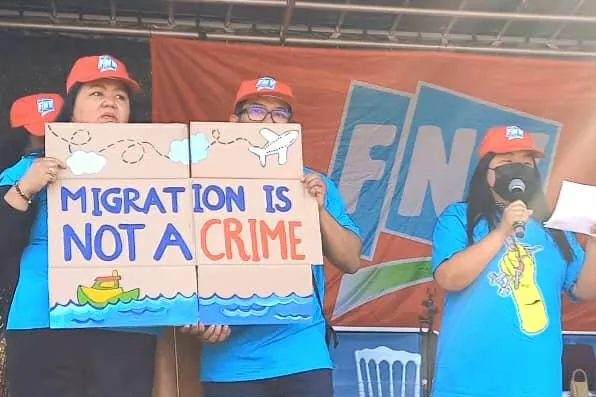
Dutch Prosecution: No Exploitation In Case Filed By Filipino And Indonesian Vs. Amsterdam Luxury Gym
AMSTERDAM—Dutch prosecutors have dropped a labour exploitation case filed by Filipino and Indonesian cleaners against a luxury gym in Amsterdam.
In an update about the case published at the Public Prosecution (Openbare Ministerie- OM) website, it says the prosecution found no evidence indicting the luxury gym after reviewing 11 reports filed by cleaners who worked there. The suspicion of human trafficking, which constitutes labor exploitation, according to the OM has been dropped in the criminal investigation.
“Based on the reports and additional investigation, it cannot be concluded that human trafficking is involved. Further investigation is underway into human smuggling and forgery,” the OM report said.
“In June 2025, during an inspection of the Amsterdam gym chain, the Dutch Labor Inspectorate found several individuals who were not authorized to work in the Netherlands. During the inspection, the Labor Inspectorate also received reports of possible labor exploitation. This is a form of human trafficking in which employees are forced to perform work under duress, violence, threats, extortion, or deception,” the OM report further said.
In a report by an Amsterdam-based newspaper, since March 2025, at least 23 cleaners from the Philippines and Indonesia have faced labor exploitation while working at the luxury gym, which has four branches in Amsterdam. The newspaper spoke with 11 individuals over several months and reviewed WhatsApp messages, photos, videos, audio recordings, and emails with the Dutch Labor Inspectorate.
The report said the cleaners lived in one of the houses of the owner but they had to share the beds with strangers, sometimes three in one bed. A Filipino was quoted as saying: “I didn't expect to have to sleep on the floor in a walk-in closet. The alternative was sharing a bed with three others.”
The cleaners reported that they had to work 78-hours in a week, sometimes working three 12-hour shifts in a row. Their passports were also taken.
“Instead of opportunity, we were trapped… We experienced exploitation and modern-day slavery. We were forced to work up to 17 hours a day, six to seven days a week, no break, no rest, and working under dangerous conditions. We were forced to do tasks beyond what were initially promised to us,” said the representative of the Filipino cleaners during a migrants’ rights rally in The Hague in September. She added that many of them were forced to carry heavy gym equipment from one floor to another.
“Some of us were asked to clean high ceilings without safety orientation or equipment,” she added.
The Filipino cleaners were recruited directly, many coming from other European countries, and the others directly from the Philippines. In the Het Parool article, alias Linae was described as a Filipina who used to work in HongKong, and then as a nanny in an unnamed EU country. Her host family moved abroad and Linae stayed behind and retrained as a massage therapist in said EU country. Through a forwarded Facebook ad in the group “Filipinos in Netherlands,” calling for “Filipina girls” to work as cleaners for the Amsterdam luxury gym, she got in touch with a woman who introduced herself as head of housekeeping. Weeks later, Linae landed at Schiphol Airport. She was so enthusiastic about the job offer that she convinced her husband to come too.
The case of the Filipinos and Indonesian cleaners was not the first time human trafficking and labor exploitation of migrants have been reported in the Netherlands and other European countries.
In September 2021, the OM also dismissed a human trafficking complaint filed by Filipino drivers, describing conditions as "unfortunate and unfavorable" but not meeting the threshold for human trafficking under their laws.
In July 2022, 174 migrant workers—mainly from Bangladesh, Turkey, and the Philippines—were found working illegally at an Austrian chemical company's factory in Belgium. Most of the Filipino workers were pipe fitters, welders, and crane operators. They were reportedly paid just €8.50 per hour, far below Belgium’s standard wage of €18–€24. Many had been hired to work in lower-wage Eastern European countries but were instead sent to do jobs in higher-paying Western Europe, where demand is greater.
A number of recruitment agencies based in Eastern European countries have been found to be only post boxes, without an actual office. The contracts were arranged in such countries because of lower wages, but the actual work, such as the Filipino truck drivers, pipe fitters and welders were performed in Western European countries.
It’s complicated—and sometimes illegal—to move lower-skilled foreign workers across European countries if their contracts are only valid in certain places. For example, countries like the Netherlands usually only allow highly-skilled workers.
(For comments and suggestions, e-mail TFCN at [email protected].)
Cover image: One of the Filipino cleaners (3rd from right) talking how fellow Filipinos and Indonesians were exploited in the luxury gym in Amsterdam.

